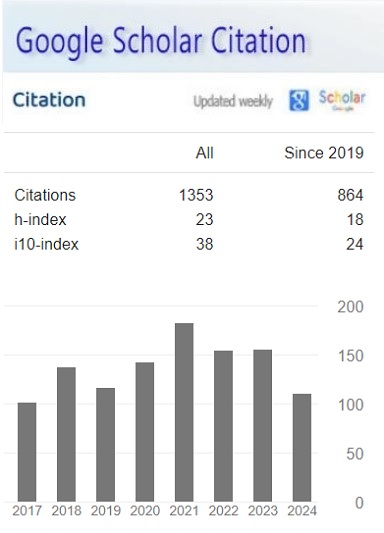Singularities in Global Hyperbolic Space-time Manifold
Keywords:
Abstract
If a space-time is timelike or null geodesically incomplete but cannot be embedded in a larger space-time, then we say that it has a singularity. There are two types of singularities in the space-time manifold. First one is called the Big Bang singularity. This type of singularity must be interpreted as the catastrophic event from which the entire universe emerged, where all the known laws of physics and mathematics breakdown in such a way that we cannot know what was happened during and before the big bang singularity. The second type is Schwarzschild singularity, which is considered as the end state of the gravitational collapse of a massive star which has exhausted its nuclear fuel providing the pressure gradient against the inwards pull of gravity. Global hyperbolicity is the most important condition on causal structure space-time, which is involved in problems as cosmic censorship, predictability, etc. Here both types of singularities in global hyperbolic space-time manifold are discussed in some details.
References
Bernal, A.N. and Sánchez, M. (2003), On Smooth Cauchy Hypersurfaces and Geroch’s Splitting Theorem, Communications in Mathematical Physics, 243(3): 461–470.
Bernal, A.N. and Sánchez, M. (2005), Smoothness of Time Functions and the Metric Splitting of Globally Hyperbolic Spacetimes, arXiv:gr-qc/0401112v3 15.
Clarke, C.J.S. (1986), Singularities: Global and Local Aspects in Topological Properties and Global Structure of Space-time (ed. P.G. Bergmann and V. de. Sabbata), Plenum Press, New York.
Geroch, R.P. (1970), Domain of Dependence, Journal of Mathematical Physics, 11: 437–449.
Geroch, R.P.; Kronheimer, E.H. and Penrose, R. (GKP) (1972), Ideal Points in Space-time, Proceedings of the Royal Society, London, A 237: 545–567.
Hawking, S.W. (1966a), The Occurrence of Singularities in Cosmology I, Proceedings of the Royal Society, London, A294: 511–521.
Hawking, S.W. (1966b), The Occurrence of Singularities in Cosmology II, Proceedings of the Royal Society, London, A295: 490–493.
Hawking, S.W. (1994), Classical Theory, arXiv:hep-th/9409195v1 30 Sep 1994.
Hawking, S.W. and Ellis, G.F.R. (1973), The Large Scale Structure of Space-time, Cambridge University Press, Cambridge.
Hawking, S.W. and Penrose, R. (1970), The Singularities of Gravitational Collapse and Cosmology, Proceedings of the Royal Society of London, Series A, Mathematical and Physical Sciences, 314: 529–548.
Hawking, S.W. and Sachs, R.K. (1974), Causally Continuous Spacetimes, Communications in Mathematical Physics, 35: 287–296.
Islam, J.N. (2002), An Introduction to Mathematical Cosmology, Cambridge University Press, Cambridge.
Joshi, P.S. (1996), Global Aspects in Gravitation and Cosmology, 2nd Edition, Clarendon Press, Oxford.
Kruskal, M.D. (1960), Maximal Extension of Schwarzschild Metric, Physical Review, 119(5): 1743–1745.
Leray, J. (1953), Hyperbolic Differential Equations, The Institute for Advanced Study, Princeton, N. J.
Minguzzi, E. and Sánchez, M. (2008), The Causal Hierarchy of Spacetimes, arXiv:gr-qc/0609119v3.
Mohajan, H. (2015). Generalization of Euler and Ramanujan’s Partition Function. Asian Journal Of Applied Science And Engineering, 4(3), 167-190.
Mohajan, H.K. (2013a), Schwarzschild Geometry of Exact Solution of Einstein Equation in Cosmology, Journal of Environmental Treatment Techniques, 1(2): 69–75.
Mohajan, H.K. (2013b), Friedmann, Robertson-Walker (FRW) Models in Cosmology, Journal of Environmental Treatment Techniques, 1(3): 158–164.
Mohajan, H.K. (2013c), Singularity Theorems in General Relativity, M. Phil. Dissertation, Lambert Academic Publishing, Germany.
Mohajan, H.K. (2013d), Minkowski Geometry and Space-time Manifold in Relativity, Journal of Environmental Treatment Techniques, 1(2): 101–109.
Mohajan, H.K. (2013e), Space-time Singularities and Raychaudhuri Equations, Journal of Natural Sciences, 1(2): 1–13.
Mohajan, H.K. (2014a), General Upper Limit of the Age of the Universe, ARPN Journal of Science and Technology, 4(1): 4–12.
Mohajan, H.K. (2014b), Upper Limit of the Age of the Universe with Cosmological Constant, International Journal of Reciprocal Symmetry & Theoretical Physics, 1(1): 43–68.
Mohajan, H.K. (2015), Basic Concepts of Differential Geometry and Fibre Bundles, ABC Journal of Advanced Research, 4(1): 57–73.
Mohajan, H.K. (2016), Global Hyperbolicity in Space-time Manifold, International Journal of Professional Studies, 1(1): 14–30.
Penrose, R. (1972), Techniques of Differential Topology in Relativity, A.M.S. Colloquium Publications, SIAM, Philadelphia.
Poisson E (2004). A relativist’s toolkit: the mathematics of black hole mechanics, Cambridge Univ. Press, Cambridge.
Sachs, R.K. and Wu, H. (1977), General Relativity and Cosmology, Bulletin of the American Mathematical Society, 83(6): 1101–1164.
Sánchez, M. (2010), Recent Progress on the Notion of Global Hyperbolicity, arXiv:0712.1933v2 [gr-qc] 25 Feb 2010.
Szekeres, P. (1960), On the Singularities of a Riemannian Manifold, Publicationes Mathematicae, Debrecen, 7: 285–301.
Wald, R.M. (1984), General Relativity, The University of Chicago Press, Chicago.
Downloads
Published
How to Cite
Issue
Section
License
Copyright (c) 2016 Asian Journal of Applied Science and Engineering

This work is licensed under a Creative Commons Attribution-NonCommercial 4.0 International License.








